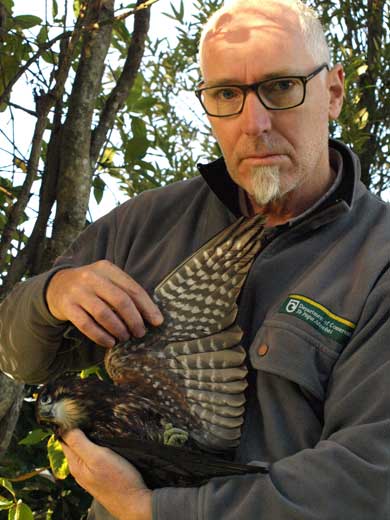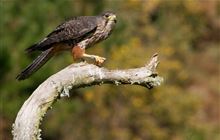Rare bird shot in Paraparaumu
Archived content: This media release was accurate on the date of publication.
Introduction
DOC seeks help on a New Zealand falcon/kārearea found shot dead in Nikau Valley, Paraparaumu.Date: 24 April 2017

Ranger David Moss with the dead kārearea
Image: Lee Barry | DOC
The birds are fully protected by law, and DOC is investigating the killing. Whoever shot the bird may face up to 2 years in prison and a $100,000 fine.
Simon and Katie Ford were devastated to discover the bird – still warm – in their back paddock in Eucalyptus Way last Thursday.
“We are planting native trees and want to encourage the birds back. We were shocked someone would shoot such a beautiful animal,” said Katie.
“We did hear from neighbours that some teenage boys at our end of the valley have been seen target shooting in the last week. A few people have responded on our valley Facebook page about seeing the bird in the few days prior and are horrified that it has been killed.”
DOC biodiversity ranger David Moss says shooting the falcon is unacceptable, no matter what the circumstances.
“It was a direct hit from a low calibre weapon, such as a .22 and appears to be intentional. For someone to shoot this bird is appalling. Not only is the kārearea a threatened species, it is a symbol of New Zealand and graces our 20-dollar note.”
“This was a young bird, probably the offspring of a pair nested nearby. A falcon in your area should be a celebration – a sign of a healthy ecosystem. Instead someone has taken its life.”
New Zealand falcon are the only falcon endemic to this country and are a top predator. They can reach speeds of up to 100km/h and hunt a range of large prey such as mammals and lizards, but other birds make up most of their diet.
“Birds are their natural food source. Unfortunately this can include domestic poultry, doves and pigeons,” said Mr Moss.
“If people experience problems with falcons attaching domestic birds, contact your local DOC office for advice, but don’t shoot them!”
DOC is appealing for information about the shooting – contact the Kapiti Wellington office on +64 4 470 8412.
What you can do
Falcons often nest on the ground, under a rocky outcrop or tree stump. Help protect nesting falcon by controlling predators in their habitat (cats, hedgehogs, stoats, weasels, ferrets and rats). Eggs and nestlings are more likely to survive, and there will be more natural food available.

